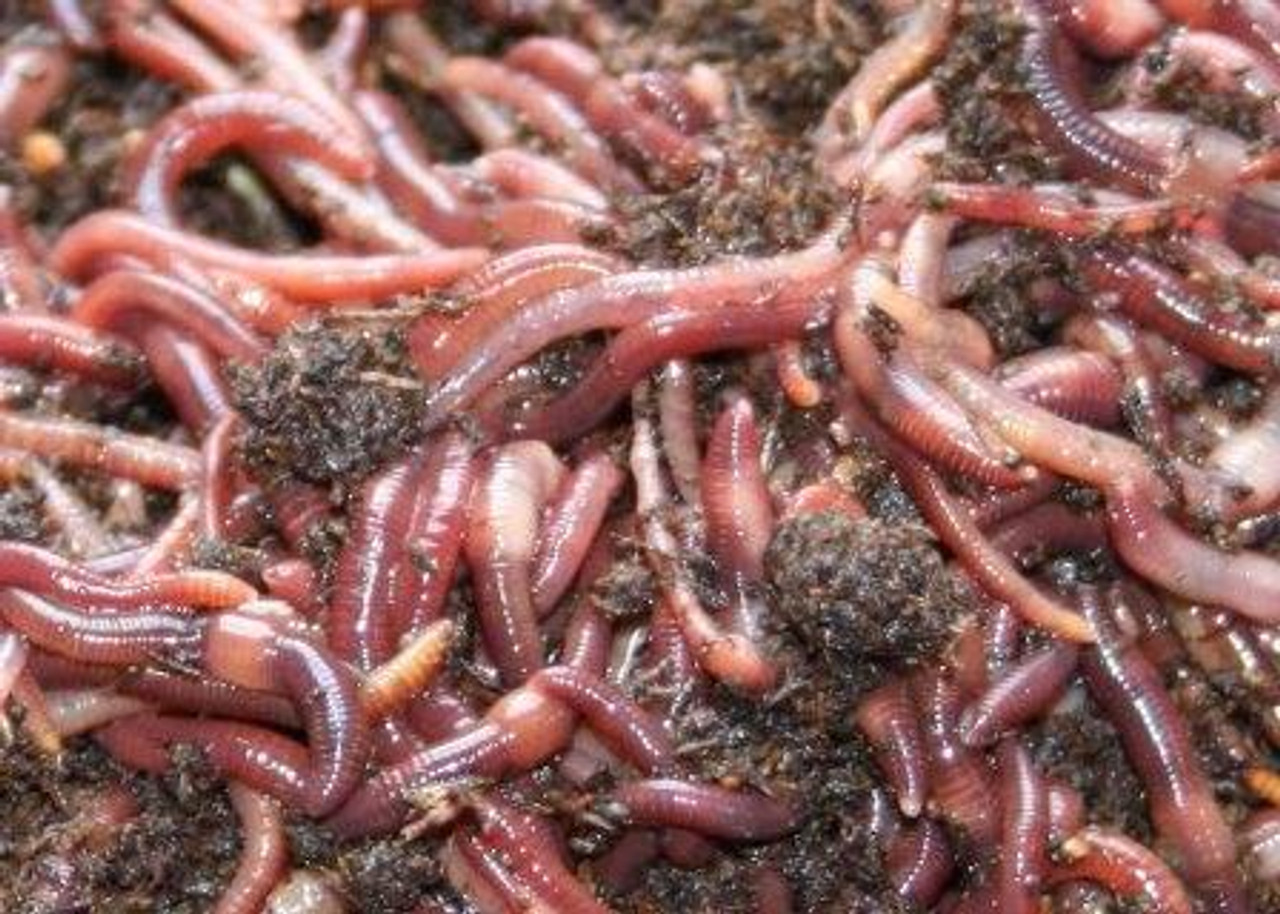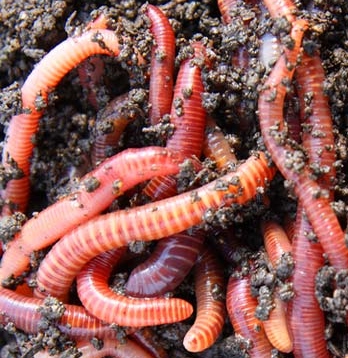Unlock the Advantages of Red Wiggler Composting for Your Organic Garden
Unlock the Advantages of Red Wiggler Composting for Your Organic Garden
Blog Article
The Benefits of Making Use Of Red Wiggler Composting: Discover Just How This Eco-Friendly Method Enhances Soil Health and Promotes Plant Development
The method of red wiggler composting provides a range of benefits that extend past easy waste management, supplying significant benefits for dirt health and wellness and plant vigor. By changing natural products into nutrient-rich worm castings, this eco-friendly method not just boosts soil framework yet also fosters a flourishing ecosystem of advantageous bacteria.
Advantages of Vermicomposting
Vermicomposting, using red wiggler worms, offers numerous advantages that contribute to sustainable waste management and soil improvement. One of the primary benefits is its efficiency in natural waste disintegration (Red Wiggler Composting). Red wigglers can eat their body weight in raw material daily, dramatically reducing kitchen area scraps and backyard waste, which reduces garbage dump payments
In addition, vermicomposting operates at cooler temperature levels contrasted to conventional composting techniques, permitting year-round handling and minimizing odor issues. The existence of red wigglers accelerates the failure of materials, producing nutrient-rich castings that boost microbial activity in the garden compost.
Moreover, this approach promotes a closed-loop system where waste is changed into a beneficial source, promoting environmental equilibrium. The convenience of taking care of a vermicomposting system makes it obtainable for both rural and metropolitan setups, urging neighborhood involvement in lasting practices.
Enhancing Soil Nutrients
The nutrient-rich spreadings produced by red wigglers act as a powerful amendment for boosting soil quality. These worm spreadings are abundant in crucial macro and trace elements such as nitrogen, phosphorus, calcium, magnesium, and potassium, which are vital for plant health and growth. Unlike artificial plant foods, which can cause nutrient leaching and dirt deterioration, worm spreadings supply a slow-release source of nutrients that boost soil framework and fertility gradually.
In addition, the raw material found in worm castings enhances dirt aeration and water retention. This is especially valuable for plants, as it facilitates better origin growth and promotes general plant vigor. The balanced nutrient account of worm castings also lessens the risk of nutrient melt that is often related to chemical fertilizers.
Integrating red wiggler compost right into yard dirt or potting mixes not just improves the vitamins and mineral material yet also sustains lasting horticulture methods - Red Wiggler Composting. By using this environment-friendly technique, garden enthusiasts can foster much healthier plants, boost plant yields, and add favorably to dirt ecosystem wellness. Generally, enhancing soil nutrients via red wiggler composting is a pragmatic technique to sustainable farming and horticulture
Promoting Beneficial Microorganisms
Just how can red wiggler composting boost the microbial diversity in soil? Red wigglers, understood for their effective disintegration of organic issue, add considerably to the establishment of an abundant microbial ecological community. As these worms eat garden compost products, they damage them down into smaller bits, making nutrients more available for various bacteria. This process cultivates a varied range of valuable bacteria, fungi, and protozoa, which are essential for dirt health and wellness.
The castings generated by red wigglers are bristling with bacteria that promote vitamins and mineral cycling and boost soil framework. These microbial neighborhoods play an essential role in damaging down raw material, launching necessary nutrients that plants can absorb. In addition, most of these microbes add to dirt aggregation, enhancing oygenation and water retention.
Moreover, the visibility of diverse microbial populaces helps reduce soil-borne illness by outcompeting hazardous virus. This natural biocontrol system is important for maintaining healthy plant development. In conclusion, red wiggler composting not only enhances the dirt with nutrients but likewise cultivates a lively microbial neighborhood, which is crucial for sustainable farming techniques and developing durable ecological communities.
Decreasing Kitchen Area Waste
Regularly forgotten in waste go to this site management discussions, red wiggler composting uses a reliable option for reducing kitchen area waste. By using red wigglers, natural cooking area scraps that would normally finish up in landfills can be transformed into nutrient-rich compost. This process substantially lessens the quantity of waste generated, therefore minimizing stress on waste administration systems and adding to sustainable living practices.

Moreover, red wiggler composting can be easily implemented in both city and country settings, making it accessible to a vast target market. This approach motivates people to embrace environment-friendly methods in their everyday lives, fostering a better understanding of waste monitoring and ecological obligation. Ultimately, red wiggler composting acts as a reliable and functional technique for lowering kitchen area waste while advertising a much more sustainable way of living.
Improving Plant Growth
Making use of red wiggler garden compost not only addresses cooking area waste reduction yet likewise significantly enhances plant growth. The nutrient-rich garden compost produced by these earthworms includes necessary macronutrients and micronutrients, consisting of potassium, phosphorus, and nitrogen, which are important for plant growth. This natural plant food adds to enhanced dirt structure, facilitating much better oygenation and water retention, which are critical for healthy origin systems.
Furthermore, red wiggler garden compost is teeming with useful microbes that promote dirt wellness. These microorganisms assist in breaking down natural matter, making nutrients much more easily accessible to plants. The visibility of advantageous microorganisms and fungis fosters a symbiotic connection with plant origins, reinforcing nutrient uptake and enhancing resistance to illness.
Additionally, making use of red wiggler compost can help regulate soil pH levels, creating an ideal atmosphere for diverse plant species. The slow-release nature of the nutrients ensures that plants obtain a constant supply over time, reducing the threat of nutrient leaching and reducing the requirement for chemical fertilizers.
Conclusion

The technique of red wiggler composting presents a variety of benefits that prolong beyond basic waste management, using substantial benefits for dirt health and plant vigor.Vermicomposting, making use of red wiggler worms, provides countless advantages that add to lasting waste management and soil improvement. Red Wiggler Composting. Unlike synthetic plant foods, which can lead to vitamins and mineral leaching and soil deterioration, worm spreadings offer a slow-release resource of nutrients that boost soil structure and fertility over time
On the whole, improving dirt nutrients via red wiggler composting is a pragmatic method to lasting agriculture and gardening.
In final thought, the application of red wiggler composting presents significant benefits for dirt health official statement and plant development.
Report this page